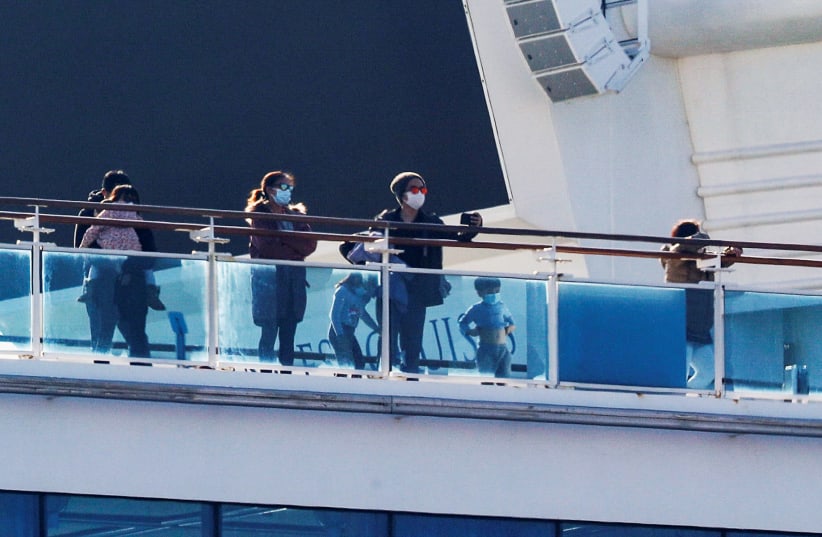A fourth Israeli contracted the coronavirus on the afflicted cruise ship Diamond Princess on Thursday, according to the Ministry of Health.The infected Israeli is expected to be taken off the ship to a Japanese hospital for further treatment.Two of the passengers aboard the ship died earlier on Thursday, public broadcaster NHK said, as a second group of passengers began disembarking after two weeks of being quarantined onboard.
More than 620 of the passengers on the Diamond Princess liner have been infected on the ship, which has been quarantined since Feb. 3, initially with about 3,700 people on board.
NHK, citing a government source, said the two fatalities were a man and woman in their 80s.
The rapid spread of the disease – Japan has well over half of the known cases outside China – has sparked criticism of authorities just months before Tokyo is due to host the Summer Olympics.
Health Minister Katsunobu Kato on Thursday defended Japan's response in parliament, telling lawmakers that officials have taken expert advice and responded to issues on a daily basis.
In a move to reassure the public, the Health Ministry also issued a statement in both English and Japanese that said all passengers had been required to stay in their cabins since February 5 to contain the virus.
Public criticism of the government has played out in social media.
Kentaro Iwata, a Japanese infectious disease specialist with Kobe University, removed a widely-viewed video clip that castigated the government response.
"There is no need for further discussing this," he said in a tweet, apologizing to "those who got involved."
He later told a news conference that he took down the video because he was informed conditions on the ship had improved.
About 500 passengers were set to disembark on Thursday while another 100 people were to leave for chartered flights home, a Health Ministry official said.
An initial batch of passengers who had tested negative and showed no symptoms left the vessel on Wednesday.
Those who have shared a room with people testing positive were required to remain in quarantine, as were crew. The ministry could not confirm how many people remained on board, or when disembarkation would be complete.
More than 150 Australian passengers arrived home after a pre-dawn departure from Tokyo's Haneda Airport. They too face another 14 days of quarantine.
Buses escorted by police cars transported the Australian passengers from Yokohama to the airport late Wednesday. The buses drove the Australians straight to the tarmac, where they boarded the government-chartered plane.
Some Hong Kong passengers also went home; Canadians were due to leave on a charter flight in the early hours of Friday, Tokyo time, a Canadian government spokeswoman said. An evacuation flight was also being arranged for British nationals to leave Tokyo on Friday.
Earlier in the week, the United States evacuated more than 300 nationals on two chartered flights.
A U.S. State Department official said there were still about 45 U.S. citizens on board the cruise ship as of Thursday.
Americans flown back will have to complete another 14-day quarantine period, as will returning Hong Kong residents.
Disembarked Japanese passengers, however, face no such restrictions, a decision that has sparked concern.
Japan's chief cabinet secretary, Yoshihide Suga, when asked on Wednesday why Japanese nationals leaving the ship did not have to spend another two weeks in quarantine, referred to the advice of Japan's National Institute of Infectious Diseases (NIID).
The NIID said there should be no problem if people had shown no symptoms for 14 days and had tested negative for the virus during the period their health was under surveillance.
Besides those on the cruise liner and returnees brought home from Wuhan, China, about 70 cases of domestic infections have been confirmed in Japan, including 25 in Tokyo, public broadcaster NHK reported.
The spread of the virus has raised concerns about planning for the Tokyo Summer Olympics as well as the impact on Japan's economy.
